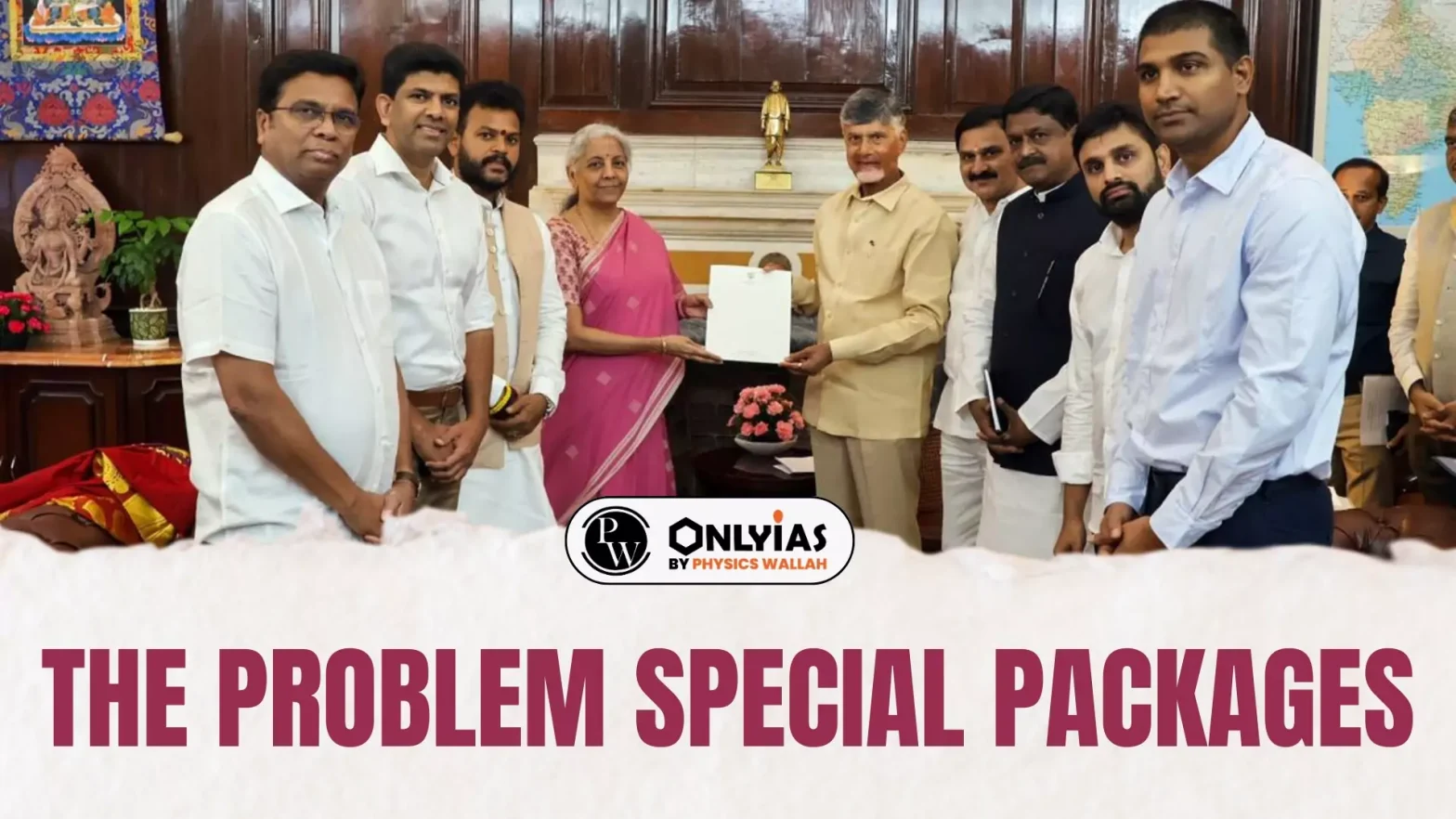Coalition politics is back at the union level in a substantial way. Formation of Coalition Government paved way for the public discussion on demand of State-specific discretionary grants, or ‘Special packages’
| Relevancy for Prelims: Indian Federal System, Indian Federalism, Constitutional Provisions, 16th Finance Commission, 15th Finance Commission, Vertical Devolution, Horizontal Distribution Parameters etc.
Relevancy for Mains: Federalism, 15th Finance Commission, Challenges faced due to ‘special packages, Federal Structure, Fiscal Federalism , etc. |
Federalism
- K. C. Wheare described the Indian Constitution as quasi-federal.
- Quasi Federal means a federal form of government where more power is given to the central government than the state government.
- India is considered a quasi-federal or semi-federal form of government
- Morris Jones defined it as ‘Bargaining Federalism’.
- Granville Austin called Indian federalism “Cooperative federalism“.
- Cooperative federalism means a combination of cooperation and interdependence between the Centre and the States to ensure smooth governance of the country.
- Chief Justice Beg called the Constitution ‘amphibian’, in the sense that it can move either on the federal or on the unitary plane, according to the needs of the situation and circumstances of a case.
Fiscal Federalism
- Fiscal federalism in India is designed to ensure the division of fiscal responsibilities and revenue sources between the central and state governments, enabling both to perform their functions effectively.
|
Coalition Politics Is Back At The Union Level In A Substantial Way
- Bharativa Janata Party is dependent on the Janata Dal (United) of Bihar and the Telugu Desam Party of Andhra Pradesh for its parliamentary majority.
- This is in contrast to 2014 and 2019, when de facto single-party governments came to office.
- Formation of Coalition Government paved way for the public discussion on demand of State-specific discretionary grants, or ‘special packages’
Enroll now for UPSC Online Course
Positive Aspect of Coalition Partners
- Check & Balance: Presence of coalition partners that can act as a check if unitary trends surge
- Federal tendencies bloom: When single-party dominance at the Union level fades, federal tendencies bloom and when a single-party majority under a strong leader at the Union level prevails, federal tendencies wilt.
Need For Transparency And Stability
- If a healthy federal structure is to be nurtured, the fiscal boundaries, principles of assignment of taxes, and the basis for grants have to be transparent and objective.
- Asymmetric but Transparent: A federal setup can be asymmetric in a country that is characterised by linguistic, cultural, and economic diversity.
- But issues of asymmetry should be addressed by means of constitutional provisions that have both transparency and stability.
Constitution Has Provisions That Address The Issues Of Specific States
- Articles 371A to H: These provisions are covered in Articles 371A to H (Article 370 for the erstwhile State of Jammu and Kashmir, of course, is abrogated).
- Additional grant under Article 282: They may be need-based, but the need is not the proximate reason for granting a special package, which is an additional grant under Article 282, which falls under ‘Miscellaneous Financial Provisions’
- Special packages are purely discretionary
- Result of the bargaining power of some State-level political parties that can tilt the scales of parliamentary majority.
- Article 280 & Article 275: The Commission is constituted by the President every five years or earlier to make recommendations regarding the distribution of a share of taxes collected by the Union to the States, and how this is to be distributed among the States, as per Article 280
- Disbursement of grants to States in need of assistance, as provided in Article 275.
Check Out UPSC CSE Books From PW Store
The 16th Finance Commission, which is already in existence, cannot be bypassed solely on account of partisan political exigencies.15th Finance Commission Recommendations (2021-26):
- Vertical Devolution:
- Share of Central Taxes for States: States are recommended to receive 41% of the divisible pool of Central taxes.
- Less than the 42% share recommended by the 14th FC.
- Adjustment of 1%: It is to provide for the newly formed union territories of Jammu and Kashmir, and Ladakh.
- Exclusions from Divisible Pool: The pool excludes costs such as tax collection expenses, cess and surcharge, revenue from Union Territories, and National Calamity Contingent Duty.
- Horizontal Distribution Parameters:
| Parameter |
Weightage (%) |
| Income Distance |
45 |
| Population (2011 Census) |
15 |
| Demographic Performance |
12.5 |
| State Area |
15 |
| Forest and Ecology |
10 |
| Tax and Fiscal Effort |
2.5 |
|
Issues
- Determines the Extent to which our polity is federal.
- Constitution has been famously described as having a quasi-federal framework.
- State of Rajasthan and Others v Union of India, 1977: The Supreme Court has made the succinct observation that our polity is amphibian – it can assume unitary and federal characters depending on whether or not there is an Emergency under Articles 352 and 356 in force
- It Determines the Federal Character: Prevailing political environment crucially determines whether federal tendencies bloom or wilt.
- Article 282 almost a factor of four times to Article 280 & Article 275
- But the fact now is that the flow of discretionary grants to the States through Article 282 have far overtaken (by almost a factor of four) that of the grants recommended by the Finance Commissions.
- Weaken the foundations of fiscal federalism: Acceding to demands for special packages which are raised by State-brd parties, holding the key to parliamentary majority, will weaken the foundations of fiscal federalism
- It will result in diverting national resources away from other States, which too may have pressing needs.
- If this is allowed to happen, we will see the paradox of federal tendencies wilting instead of blooming when single-party dominance fades.
Enroll now for UPSC Online Classes
![]() 8 Jul 2024
8 Jul 2024
